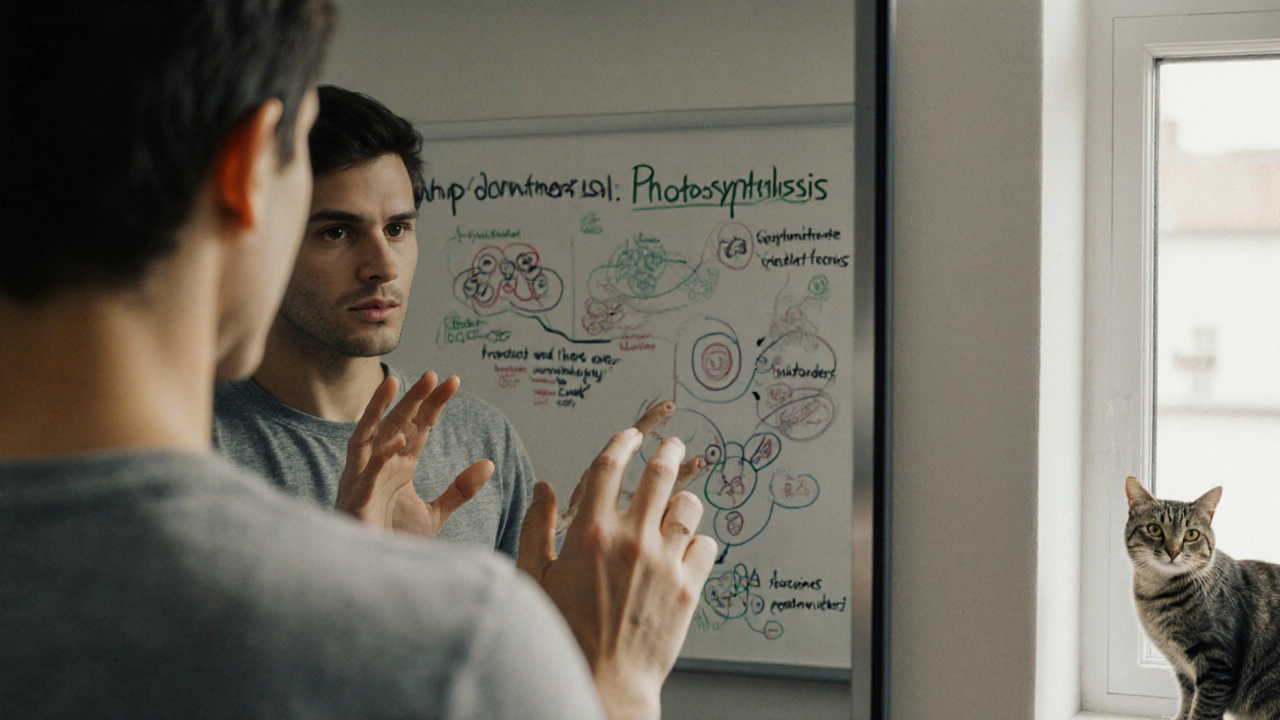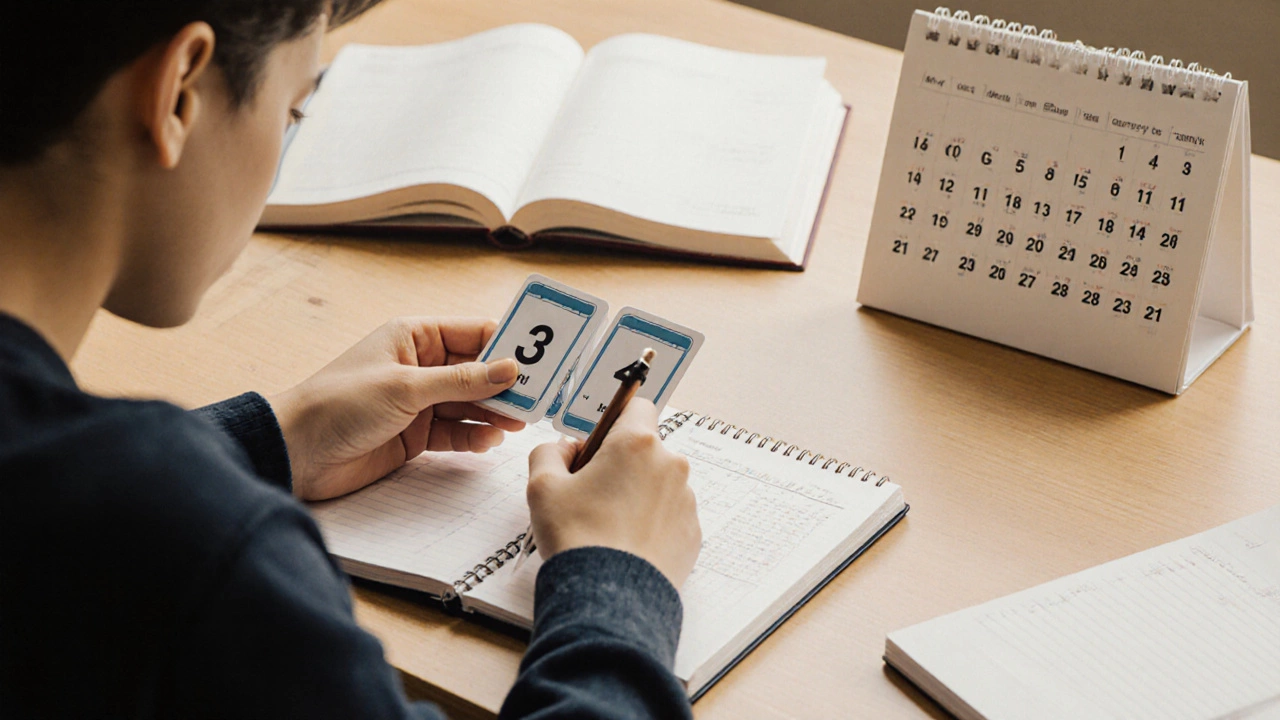Spaced Repetition Planner
Plan Your Study Sessions
How This Works
Based on cognitive science, spaced repetition shows you when to review material for maximum retention. Your brain forgets quickly after initial learning, but reviewing at optimal intervals strengthens memory.
Your Study Schedule
Start studying and review every days
Studying for an exam isn’t about how many hours you sit at your desk. It’s about how well you use those hours. You’ve probably pulled all-nighters before, reread notes until your eyes glazed over, or highlighted entire textbooks-only to walk into the exam room feeling completely unprepared. That’s not because you’re not smart. It’s because you’re using methods that don’t match how your brain actually learns.
Stop Rereading and Start Retrieving
Rereading your notes feels productive. It looks like progress. But research from the University of California, Los Angeles shows that rereading gives you a false sense of mastery. You recognize the words, so you think you know them. But recognition isn’t recall. The brain remembers what it has to work to remember.
Instead of rereading, test yourself. Use flashcards-physical or digital. Cover the answer and try to say it out loud. If you can’t, you’ve found a gap. If you can, move on. This is called retrieval practice, and it’s one of the most powerful study techniques proven by cognitive science. A 2011 study in Science found students who used retrieval practice scored 50% higher on delayed tests than those who just reread.
Try this: After reading a chapter, close the book. Write down everything you remember. Then check. Don’t just correct mistakes-figure out why you forgot. That’s where real learning happens.
Space Out Your Study Sessions
Cramming the night before works… for a day. But your brain forgets fast if you overload it. The spacing effect is simple: study in short bursts over several days, not one long marathon.
Here’s how to do it: If your exam is in two weeks, start reviewing material at least seven days in advance. Review Day 1 content on Day 3, then again on Day 6, then Day 10. Each time you revisit something after forgetting it a little, your brain strengthens the memory. This is called spaced repetition.
Apps like Anki or Quizlet automate this for you. But you don’t need tech. Just grab a calendar. Mark three key topics to review each day. Even 20 minutes a day, spread out, beats three hours the night before.
Teach It to Someone (Even If They’re Not There)
When you explain something to someone else, you can’t hide behind vague terms or copied phrases. You have to make it clear. That forces your brain to organize the information properly.
Try the Feynman Technique: Pick a concept. Explain it out loud like you’re teaching a 12-year-old. Use simple words. If you stumble, go back. If you use jargon without understanding it, you haven’t mastered it yet.
You don’t need a study partner. Talk to your pet, your mirror, or record yourself on your phone. Play it back. Where did you get fuzzy? That’s your weak spot.
Use Active Learning, Not Passive Highlighting
Highlighting text feels like you’re doing something. It’s not. You’re just coloring. Passive reading doesn’t build memory. Active engagement does.
Turn your notes into questions. Instead of writing “Photosynthesis converts sunlight into energy,” write: “What does photosynthesis do?” Then answer it in your own words. Create diagrams. Draw the water cycle. Sketch the steps of mitosis. Use colors to connect ideas. The more senses you involve, the more your brain locks it in.
Here’s a quick rule: If you’re not writing, drawing, speaking, or testing yourself-you’re not studying. You’re just reading.

Study in Different Places
Most people study in the same spot: their bed, the kitchen table, the same corner of the library. That’s a mistake. Your brain links memories to context. If you only study in one place, your brain thinks, “This info only matters here.”
Change your environment. Study in the library one day, a coffee shop the next, a park bench after lunch. Even switching rooms in your house helps. This is called context-dependent learning. It forces your brain to focus on the content, not the surroundings. That means you’ll recall it better in the exam hall-no matter where it is.
Get Enough Sleep-Seriously
You can’t out-study a lack of sleep. During deep sleep, your brain sorts through the day’s information and moves important stuff from short-term to long-term memory. Skipping sleep to study is like building a house on sand.
Studies show students who sleep 7-9 hours before an exam perform better than those who pull all-nighters-even if the all-nighters studied more hours. Sleep doesn’t just help you remember. It helps you think clearly, solve problems, and avoid silly mistakes.
Don’t study past midnight. Set a hard stop. Use that time to relax, not cram. Your brain will thank you.
Simulate the Exam Environment
Exams aren’t open-book, open-note, open-phone. So why do you study that way?
Practice under real conditions. Set a timer. Close your books. Answer past papers or sample questions without looking anything up. Treat it like the real thing. This builds exam stamina and reduces anxiety.
After each practice test, review your answers-not just the ones you got wrong. Look at the ones you got right but weren’t sure about. Those are your hidden gaps.
If you’re taking a math exam, do problems by hand. If it’s an essay exam, write full answers-not outlines. If it’s multiple choice, time yourself. The more your practice matches the real thing, the less strange it will feel on exam day.

Know Your Energy Cycles
Not everyone is a morning person. Some people think best after dinner. Your brain has natural highs and lows. Don’t fight them.
Track your focus for a few days. When do you feel sharp? When do you zone out? Schedule your hardest subjects during your peak hours. Save lighter tasks-like reviewing flashcards or organizing notes-for when you’re tired.
If you’re a night owl, don’t force yourself to study at 7 a.m. Just don’t wait until 2 a.m. to start. Find your sweet spot and protect it.
What to Do the Night Before
Don’t cram. Don’t panic. Don’t check Reddit for “last-minute tips.”
Do this instead:
- Review your summary sheet-just one page of key formulas, dates, or concepts.
- Get your materials ready: ID, calculator, pens, water.
- Go to bed at your normal time.
- Do something relaxing: listen to music, take a walk, stretch.
That’s it. You’ve done the work. Now trust it.
What to Do During the Exam
Read the instructions. Twice.
Skim the whole paper first. Mark the questions you know well. Do those first. It builds confidence and saves time.
If you get stuck, move on. Don’t waste 15 minutes on one question. Come back later. Often, the answer will click when you’re not staring at it.
Write clearly. Even if your answer isn’t perfect, show your thinking. Many exams give partial credit for process, not just the final answer.
And if your mind goes blank? Breathe. Count to five. Look at the ceiling. Your brain just needs a reset.
How long should I study each day for an exam?
There’s no magic number. Focus on quality over quantity. Two focused hours with active recall and spaced review are better than six hours of passive rereading. Most effective students study 1-2 hours per subject per day, spread across multiple days. Adjust based on your exam date and difficulty.
Is it better to study alone or in a group?
Both have value, but they serve different purposes. Study alone to build your own understanding using retrieval and spaced repetition. Study in a group to test your explanations, clarify confusion, and hear different perspectives. Don’t let group sessions turn into social hours. Set a clear agenda and time limit.
What’s the best way to remember formulas or dates?
Use memory tricks called mnemonics. For example, to remember the order of operations in math (Parentheses, Exponents, Multiplication, Division, Addition, Subtraction), use “Please Excuse My Dear Aunt Sally.” For dates, link them to personal events or stories. “The Berlin Wall fell in 1989-the same year I got my first bike.” The weirder the link, the better it sticks.
Should I use apps or stick to paper notes?
It depends on what works for you. Digital tools like Anki or Notion are great for spaced repetition and organization. But writing things by hand improves memory retention. Try mixing both: write summaries by hand, then turn them into digital flashcards. The key isn’t the tool-it’s whether you’re actively engaging with the material.
How do I stay motivated when I don’t feel like studying?
Motivation follows action, not the other way around. Start with just five minutes. Open your notes. Read one paragraph. Answer one question. Often, starting is the hardest part. Once you begin, momentum kicks in. Also, reward yourself after each session-5 minutes of music, a snack, a walk. Small wins build consistency.
What if I still feel anxious before the exam?
Anxiety is normal. It doesn’t mean you’re unprepared. Practice deep breathing: inhale for 4 seconds, hold for 4, exhale for 6. Repeat three times. Remind yourself: you’ve done the work. You don’t need to be perfect-you just need to show what you know. Most people overestimate how much they’ll forget and underestimate how much they’ve learned.
Final Thought: It’s Not About Hours, It’s About Strategy
Effective studying isn’t about how hard you work. It’s about how smart you work. You don’t need to be the person who studies the longest. You need to be the person who remembers the most. Use retrieval, space it out, teach it, move around, sleep well, and practice like it’s the real thing. That’s how you turn effort into results.


Write a comment